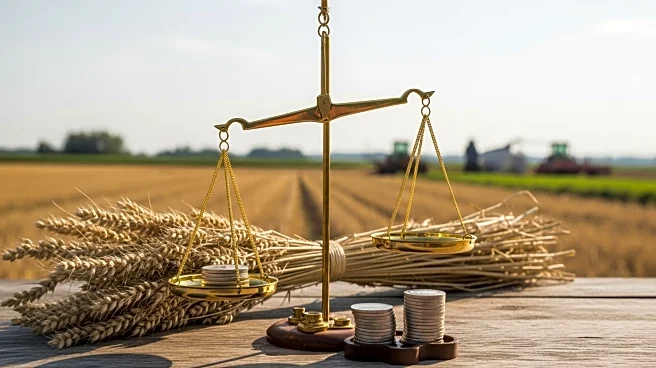What is the story about?
What's Happening?
The U.S. Department of Agriculture (USDA) is facing criticism due to the ongoing government shutdown, which has led to the furlough of half of its nearly 86,000 employees. Essential functions like food inspections continue, but programs such as the Farm Service Agency, responsible for distributing loans and financial aid to farmers, are severely impacted. This situation is exacerbated by President Trump's tariff policies, which have led to a trade war with China. China has retaliated by imposing its own tariffs and refusing to buy U.S. soybeans, significantly affecting American farmers. The Trump administration is considering a $10 billion bailout for farmers, funded by tariff revenue, to mitigate the financial strain.
Why It's Important?
The shutdown and tariff policies are creating significant economic challenges for U.S. farmers, a key constituency for President Trump. The trade war with China has disrupted the agricultural market, particularly for soybean farmers, who rely heavily on exports to China. The proposed bailout aims to provide relief, but it highlights the broader issues of trade policy and economic stability in the agricultural sector. The situation underscores the political and economic tensions between the U.S. and China, affecting not only farmers but also the broader economy due to increased prices on consumer goods.
What's Next?
The Trump administration is expected to announce the farmer bailout plan next week, which could provide temporary relief. However, the long-term resolution of the trade war and the government shutdown remains uncertain. Political leaders and stakeholders in the agricultural industry are likely to continue advocating for more sustainable trade agreements and market opportunities. The ongoing political debate over the shutdown and trade policies will continue to impact farmers and the agricultural economy.
Beyond the Headlines
The situation raises ethical and political questions about the use of tariffs and government shutdowns as political tools. The impact on farmers, who are a significant part of Trump's political base, could lead to shifts in political support and influence future policy decisions. The broader implications for international trade relations and economic policy are significant, as the U.S. navigates its position in global markets.















